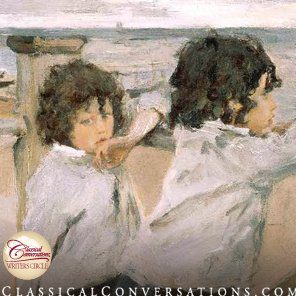Classical education is a “curious thing,” viewed from the perspective of a traditional educator. Traditional education emphasizes acquiring knowledge of a host of subjects through the passing of a multitude of classes en route to receiving a diploma. Classical education emphasizes the skills of learning and the acquisition of the “lost tools of learning” we are eager to grasp. Our yearning to provide a classical education for our students includes the goal of pursuing truth, beauty, and goodness, not just a diploma. And yet, can we, perhaps, use classical education principles to cultivate virtue while satisfying a diploma program?
The answer to this question is a resounding, “Yes!” The process involves a change in focus for those of us who were traditionally schooled; we must pursue skills, not subjects. We commit to spending the high school years working on just six skills: grammar, exposition, debate, research, rhetoric, and logic.
The skill of grammar involves memorizing vocabulary and learning how language fits together. In the classical sense, almost all learning begins with vocabulary; learning words enables us to explore ideas! Also, students must learn how words relate to one another within the language; how do you recognize a noun? A verb? Most students will use a foreign language to sharpen the grammar skill, and many classical educators choose Latin. Learning the structure of a given language trains the brain to recognize the patterns that are useful in learning other languages, as well. A student who learns that Latin has declensions, conjugations, verb tenses, and so on recognizes that similar structure can be imposed on another language en route to mastery.
The skill of exposition involves comprehending literature’s themes, and writing about them clearly and persuasively. Students must learn to read for understanding, incorporating the new information they glean from their reading into the context of the knowledge they have acquired through their studies. Recognizing major themes in literature leads students to ponder big ideas and become students of human nature as well as literature. Classical students most often focus on these themes by studying American literature, British literature, world literature, and ancient literature.
The skill of debate is more than skillful, spirited arguing. Students focus on sharpening their ability to analyze cause and effect as well as the skill of constructing arguments and presenting them effectively. Classical educators use the study of history to help students integrate a chronology of events with an understanding of the cause and effect of these events. Students are led to analyze history for the lessons inherent within the happenings; they begin to see the world’s events within the context of history, and are thus able to judge more clearly what was, what is, and what should be.
The skill of research is a more easily identified skill for many. Learning to observe, record, and evaluate are aspects of the research skill that classical students hone most frequently with scientific pursuits. Students who learn the basics of the scientific method and are encouraged to practice it throughout their high school science studies learn to think clearly and carefully about the facts; they learn to observe, record results, and only then to draw conclusions. Lab sciences, such as physical science, biology, chemistry, and physics, help our classical students learn the fundamentals of scientific inquiry while teaching them to carefully document their findings.
The skill of rhetoric is fundamental to the student who pursues wisdom in addition to knowledge and understanding. This skill, so little emphasized in public education, is a key element in the leadership education which we are eager to provide for our students. The skill of rhetoric is comprised of thinking logically and presenting thoughts and conclusions persuasively. Students hone this skill through the study of formal logic, philosophy, and theology, and they sharpen their communication skills through a focus on the five canons of rhetoric. Classical students are prepared with good ideas and the ability to persuade others to join them in their convictions.
The skill of logic is most easily sharpened by studying mathematics. The skill of understanding the orderly, structured language of math, and using that language to solve problems, shapes the thinking patterns of classical students. Understanding how to order thoughts and information in preparation for using that information to solve problems and find truth is key to becoming a truly educated person. Most classical educators use algebra and the applied math of trigonometry, calculus, and statistics to hone their students’ logic skills.
Many of us, now firmly convinced that a classical education is the most desirable education, must constantly remind ourselves that we are pursuing skills, not acquiring credits for subjects. The specific curriculum chosen is less important than the skills nurtured with your work. The skills of grammar, exposition, debate, research, rhetoric, and logic are the building blocks for true education in the classical sense.




